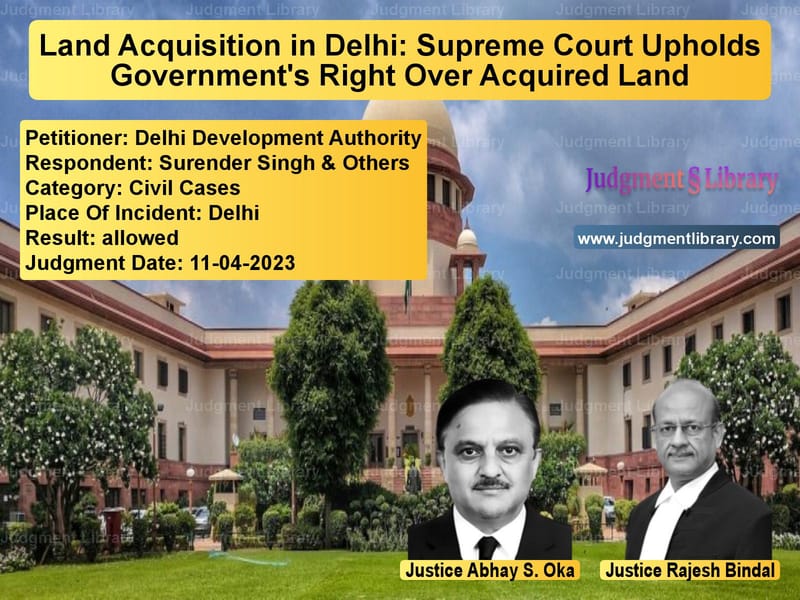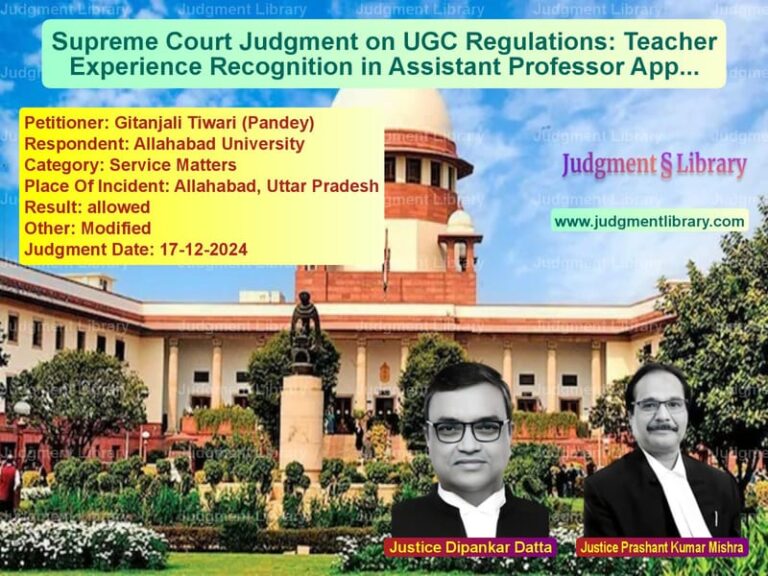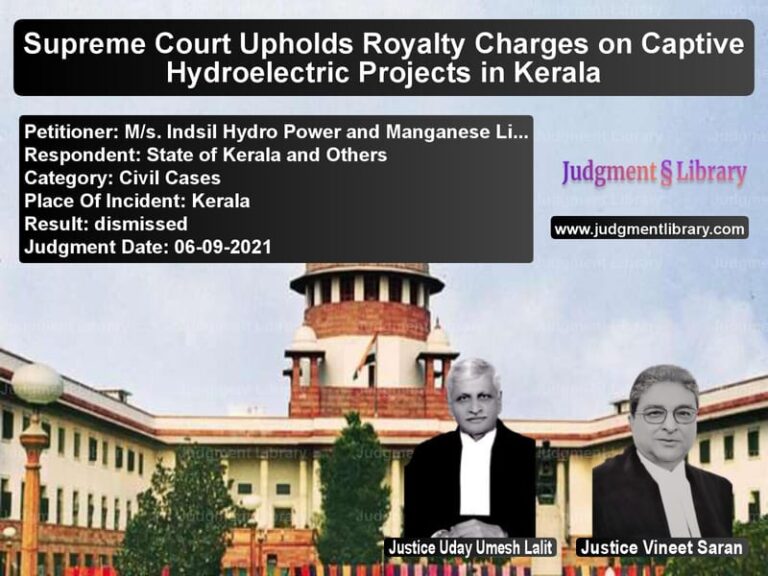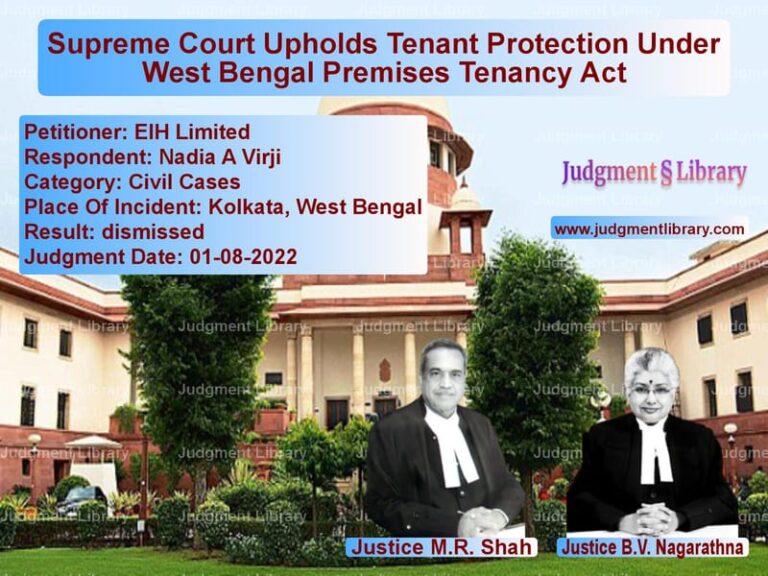Land Acquisition in Delhi: Supreme Court Upholds Government’s Right Over Acquired Land
The Supreme Court of India, in the case of Delhi Development Authority v. Surender Singh & Others, ruled on the issue of land acquisition under the Land Acquisition Act, 1894, and its impact under the Right to Fair Compensation and Transparency in Land Acquisition, Rehabilitation and Resettlement Act, 2013. The ruling reaffirmed that once possession of acquired land is taken and compensation is tendered, the acquisition does not lapse under the 2013 Act.
Background of the Case
The appeals arose from multiple cases where landowners had challenged the validity of land acquisitions in Delhi, claiming that the acquisitions had lapsed under Section 24(2) of the 2013 Act. The respondents argued that possession had not been taken, and compensation had not been paid, thereby rendering the acquisition null and void.
The Delhi Development Authority (DDA) and the Government of the National Capital Territory of Delhi (GNCTD) contended that possession had been taken in all cases and that compensation had been deposited. They relied on the Constitution Bench ruling in Indore Development Authority v. Manoharlal & Others (2020) 8 SCC 129, which overruled the earlier judgment in Pune Municipal Corporation v. Harakchand Misirimal Solanki (2014) 3 SCC 183.
Petitioner’s Arguments (Delhi Development Authority & Government of NCT Delhi)
The DDA and GNCTD argued:
- The acquisition process was legally completed with possession taken and compensation deposited.
- The Constitution Bench in Indore Development Authority had clarified that even if compensation is deposited in the treasury, rather than paid directly to landowners, the acquisition does not lapse.
- The respondents were trying to take advantage of the earlier misinterpretation of the law under the Pune Municipal Corporation ruling.
- The possession had been taken in all cases and handed over to the DDA for development.
Respondent’s Arguments (Landowners)
The landowners, represented by their counsel, countered:
- The authorities had not paid compensation directly to the landowners.
- The acquisition should lapse under Section 24(2) of the 2013 Act because compensation had not been tendered.
- Since the High Court had ruled in their favor based on the Pune Municipal Corporation case, the Supreme Court should not overturn the decision.
Key Legal Issues
The Supreme Court considered:
- Does land acquisition lapse if compensation is not paid directly to landowners?
- Is possession of land sufficient to prevent the acquisition from lapsing?
- What is the correct interpretation of Section 24(2) of the 2013 Act?
Supreme Court’s Observations
The Supreme Court ruled in favor of the DDA, stating:
- “The judgment in Pune Municipal Corporation is overruled. If possession is taken or compensation is deposited, the acquisition remains valid.”
- “Landowners cannot claim lapse of acquisition merely because compensation was deposited in the treasury instead of being paid directly.”
- “Judicial review cannot be used to delay government development projects by reopening concluded acquisitions.”
The Court further referred to:
- Indore Development Authority v. Manoharlal (2020) – Held that compliance with either possession or compensation is enough to sustain the acquisition.
- Shiv Kumar v. Union of India (2019) 10 SCC 229 – Overruled the previous understanding in Manav Dharma Trust and held that once possession is taken, the land vests in the government.
Final Judgment
The Supreme Court allowed the appeals and ruled:
“Since possession of the land was taken by the Land Acquisition Collector and handed over to the DDA, the acquisition has not lapsed. The appeals are allowed, and the High Court’s orders are set aside.”
Legal Impact and Significance
- Clarifies Section 24(2) of the 2013 Act: Acquisition does not lapse if either possession is taken or compensation is deposited.
- Limits the misuse of judicial review: Prevents landowners from challenging completed acquisitions.
- Ensures continuity in public projects: Strengthens government development plans by preventing acquisition lapses.
Conclusion
The Supreme Court’s ruling in Delhi Development Authority v. Surender Singh confirms that land acquisitions remain valid even if compensation is not directly paid but deposited with the government. This decision reinforces the principles set out in Indore Development Authority and ensures that land acquisitions for public projects are not arbitrarily challenged. The ruling is a significant step toward balancing landowners’ rights with the government’s need for planned development.
Petitioner Name: Delhi Development Authority.Respondent Name: Surender Singh & Others.Judgment By: Justice Abhay S. Oka, Justice Rajesh Bindal.Place Of Incident: Delhi.Judgment Date: 11-04-2023.
Don’t miss out on the full details! Download the complete judgment in PDF format below and gain valuable insights instantly!
Download Judgment: delhi-development-au-vs-surender-singh-&-oth-supreme-court-of-india-judgment-dated-11-04-2023.pdf
Directly Download Judgment: Directly download this Judgment
See all petitions in Property Disputes
See all petitions in Damages and Compensation
See all petitions in Landlord-Tenant Disputes
See all petitions in Judgment by Abhay S. Oka
See all petitions in Judgment by Rajesh Bindal
See all petitions in allowed
See all petitions in supreme court of India judgments April 2023
See all petitions in 2023 judgments
See all posts in Civil Cases Category
See all allowed petitions in Civil Cases Category
See all Dismissed petitions in Civil Cases Category
See all partially allowed petitions in Civil Cases Category







